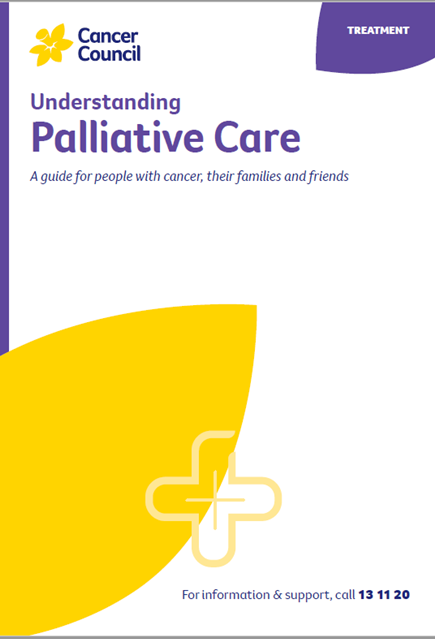- Home
- Pleural mesothelioma
- Managing symptoms
- Palliative treatment
- Understanding palliative care
Understanding palliative care
Many people fear hearing the words palliative care because they think it is just for people who are dying, but it’s not. Palliative care is useful at all stages of advanced cancer and involves a range of services that can help with many things like pain management or getting around more easily.
What is palliative care?Palliative care is person-centred care that helps people with a progressive life-limiting illness to live as fully and as comfortably as possible. Palliative care can link you with support. For example, you may need help to move around your home more safely. The main goal is to help you maintain your quality of life by identifying and meeting your physical, emotional, cultural, social and spiritual needs. It also provides support to families and carers. | |
Who is in a palliative care team?Palliative care may be led by your GPor community nurse, or by the specialist palliative care team in your area. The team may include doctors, nurses, social workers, physiotherapists, occupational therapists, and spiritual care practitioners. They may also link you to a counsellor, psychologist or other health professionals. | |
Where is palliative care usually given?The palliative care team will help you to work out the best place for your care. This may be in your own home supported by community palliative care services, in hospital, at a residential aged care facility or in a palliative care unit (sometimes called a hospice). Many health care services are now available to you at home. | |
How can palliative care help?Palliative care involves a range of services that will be tailored to your individual needs. There are various ways it can help, including:
| |
When can I start care?Depending on your needs, you may use palliative care service occasionally or continuously, for a few weeks or months. The number of people receiving palliative care for several years is increasing. Contacting the palliative care team early means that you can find out what the different team members do and see which services might be useful now or in the future. This will vary according to how you feel, what problems you have, and how your carers are managing. | |
Where to find out moreFor more information about what palliative care is and how it helps, visit Palliative Care Australia. Use the directory on this website to find a palliative care service i your local area, or speak to your doctor or nurse. |
→ READ MORE: Living with pleural mesothelioma
Podcast for people affected by advanced cancer
Listen now
More resources
Dr Anthony Linton, Medical Oncologist, Concord Cancer Centre and Concord Repatriation General Hospital, NSW; Dr Naveed Alam, Thoracic Surgeon, St Vincent’s Hospital Melbourne and Monash Medical Centre, VIC; Donatella Arnoldo, Consumer; Polly Baldwin, 13 11 20 Consultant, Cancer Council SA; Dr Melvin (Wee Loong) Chin, Medical Oncologist, Sir Charles Gairdner Hospital and National Centre for Asbestos Related Diseases, WA; Prof Kwun Fong, Thoracic and Sleep Physician and Director, UQ Thoracic Research Centre, The Prince Charles Hospital, and Professor of Medicine, The University of Queensland, QLD; Vicki Hamilton OAM, Consumer and CEO, Asbestos Council of Victoria/GARDS Inc., VIC; Dr Susan Harden, Radiation Oncologist, Peter MacCallum Cancer Centre, VIC; Penny Jacomos, Social Worker, Asbestos Diseases Society of South Australia, SA; Prof Brian Le, Director, Parkville Integrated Palliative Care Service, The Royal Melbourne Hospital and Peter MacCallum Cancer Centre, VIC; Lung Cancer Support Nurses, Lung Foundation Australia; Jocelyn McLean, Mesothelioma Support Coordinator, Asbestos Diseases Research Institute, NSW; Prof David Morris, Peritonectomy Surgeon, St George Hospital and UNSW, NSW; Joanne Oates, Registered Occupational Therapist, Expert Witness in Dust Diseases, and Director, Evaluate, NSW; Chris Sheppard and Adam Barlow, RMB Lawyers.
View the Cancer Council NSW editorial policy.
View all publications or call 13 11 20 for free printed copies.
Need to talk?
Support services
Need legal and financial assistance?
Practical advice and support during and after treatment
Looking for transport, accommodation or home help?
Practical advice and support during and after treatment
Cancer information
Advanced cancer
Advanced cancer is when cancer has spread from its original site or has come back
Palliative care
Palliative care (sometimes called supportive care) addresses the needs of people with a life-limiting illness in a holistic way

